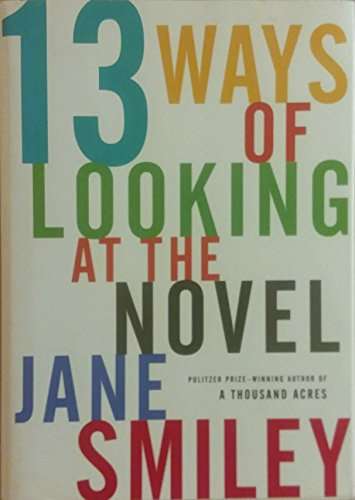
13 Ways of Looking at the Novel
Check my rate
| Main centres: | 1-3 business days |
| Regional areas: | 3-4 business days |
| Remote areas: | 3-5 business days |

| Main centres: | 1-3 business days |
| Regional areas: | 3-4 business days |
| Remote areas: | 3-5 business days |
Knopf, 2005, hardcover, index, 591 pages, condition: very good.
Pulitzer Prize winner and bestselling novelist Jane Smiley celebrates the noveland takes us on an exhilarating tour through one hundred of themin this seductive and immensely rewarding literary tribute. In her inimitable styleexuberant, candid, opinionatedSmiley explores the power of the novel, looking at its history and variety, its cultural impact, and just how it works its magic. She invites us behind the scenes of novel-writing, sharing her own habits and spilling the secrets of her craft. And she offers priceless advice to aspiring authors. As she works her way through one hundred novelsfrom classics such as the thousand-year-old Tale of Genji to recent fiction by Zadie Smith and Alice Munroshe infects us anew with the passion for reading that is the governing spirit of this gift to book lovers everywhere.
Smiley started writing 13 Ways of Looking at the Novel while she was suffering writer's block post-9/11. She decided to "go back to her roots" by reading through a bunch of novels 100 of them and over the course of three years, besides writing lovely and incisive synopses and literary analyses of all of them, produced this book about what a novel is. She also talked about how novels form society and form the mind, not just the other way around. So, Jane Smiley is what you might call one o' them elitist lib'rul intellectual types. More power to her while her literary tastes aren't exactly the same as mine (there is a hint of snootiness in her studious avoidance of much of anything that smacks of pop fiction, though of course some of the books she mentions were bestsellers because they were great books), her point is well taken, and one I wish more people took seriously. Not that a Presidential candidate's choice in reading is necessarily a litmus test for fitness of office, but you do have to kind of wonder about someone who hasn't read an actual book since high school. (Which unfortunately describes most of American society.) The main reason I read is because I enjoy reading (duh), but I also read because I think it exercises the mind and it's good to have some intellectual pursuits, which is also why I've been reading more classics and "literary" books lately, even though I've always been more of a SF&F fan. 13 Ways of Looking at the Novel is great because Smiley articulates a lot of my thoughts about novels that I had no clue how to articulate before, points out a lot of things I always knew intuitively but couldn't describe intelligibly, and also taught me a lot of things I didn't know. Besides tracing the history of Western literature (Smiley does mention a few non-European/American books, but mostly it's pretty Eurocentric), this book describes several different models for looking at novels as a reader, as a critic, as a historian, as a writer. The first half of the book is all about novels as novels, and novelists. Aspects of the novel you've probably never consciously thought about before unless you're a literature major, like types of discourse and questions novels ask about society and what novels say about society as social documents and so on. If this sounds kind of dull, it's not, actually, if you are a true lover of literature. I'd call this book a "biography of the novel," if you consider the novel a historical character with a history going back (depending on how you reckon it) 400 years or a thousand. In the second half of the book, Smiley summarizes and talks about the 100 novels she read to overcome her writer's block. It's not really fair for me to describe this as a recommendations list, because she doesn't actually claim they are the 100 best books ever, nor are they her 100 favorite books (in fact, several of them she says outright she didn't like). She chose each one because she thought it had an important place in the novelistic landscape, either because it was historically important, or because it was the greatest example of a certain type of novel, or because it was so influential on so many subsequent novelists, etc. If like me you read a lot but sometimes have trouble saying much more about a book than whether or not you liked it, you will envy Smiley's ability to tease apart every little detail about a novel's structure, pacing, prose, themes, characterization, and then to put it in a historical and literary context and talk a little bit about the author. T